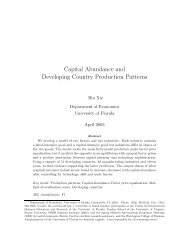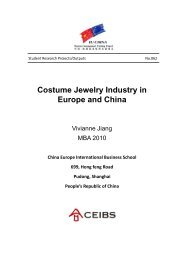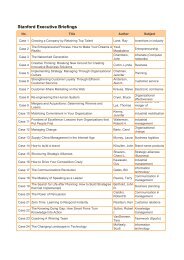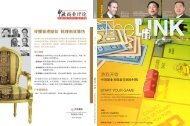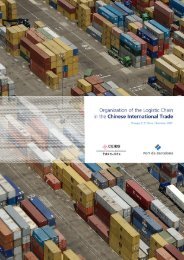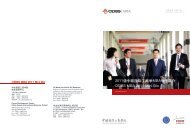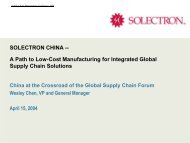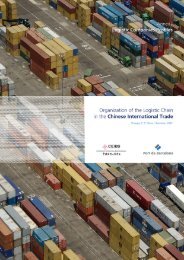PERSPECTIVES ON THE EVOLUTION OF THE AUTOMOBILE ...
PERSPECTIVES ON THE EVOLUTION OF THE AUTOMOBILE ...
PERSPECTIVES ON THE EVOLUTION OF THE AUTOMOBILE ...
Create successful ePaper yourself
Turn your PDF publications into a flip-book with our unique Google optimized e-Paper software.
Automotive Industry in China<br />
IV Scenarios and conclusions<br />
1. Scenarios: development routes<br />
1.1 Drivers<br />
1. The recovery of the Chinese Economy might come sooner than the European and<br />
the U.S. economy’s recovery. Automotive companies in Europe and the U.S. are<br />
among the most affected by the recession. Chinese automotive companies can react in<br />
different ways to this fact.<br />
2. Chinese government has labeled the Automotive Industry as a main pillar to<br />
support the development of the national economy. As it has been analyzed in the<br />
report, the current situation in the car industry in China is not sustainable. The<br />
Chinese automotive industry cannot have a healthy development with the existing<br />
surplus of manufacturers (around 100 car manufacturers).<br />
Consequently, the government is pushing for the consolidation of the industry. The<br />
government has a plan to reduce the number of car manufacturers in China to a group<br />
of 5 Big companies and some few other medium ones.<br />
Since the Chinese government controls the bank loans, it has a big power in the<br />
decision making process of any merger or acquisition. In fact, the government could<br />
almost determine which companies are merged together. The bigger the companies<br />
resulting from the consolidation, the more power they will have. Besides, this new<br />
companies will have enough capacity to begin to export massively. However, we<br />
should not underestimate the complexity of the mergers & acquisitions.<br />
3. China is facing tremendous environmental problems. The main ones are related<br />
to the water availability and quality, and the air quality in the over crowded Chinese<br />
cities. The situation has reached a critical degree where people’s health is at risk. The<br />
government is taking action to avoid irreversible damages by the pollution and to<br />
improve the quality of living.<br />
4. With China entrance in the WTO, sooner or later the automotive industry will be<br />
liberalized. When the moment arrives, the MNCs will not be forced to have a<br />
Chinese partner. In this scenario, MNCs will choose to establish an independent<br />
operation in China and therefore, the JVs will disappear. However it is not clear what<br />
will happen in the market. Some people believe that Chinese manufacturers will buy<br />
the assets from the JV. Other people defend that MNC will be in a very weak position<br />
in the domestic market because, even if they acquire the Chinese part of the JV, from<br />
one day to another they will lose their dealer network.<br />
5. Protectionist politics worldwide: Chinese companies exporting abroad will not<br />
only depend on their own capabilities to produce cars acceptable by the customers<br />
and standards of the different countries. The protectionist policies that the<br />
government may put in place to protect their national car manufacturers will<br />
definitely play a main role.<br />
Port of Barcelona Chair of Logistics 42



